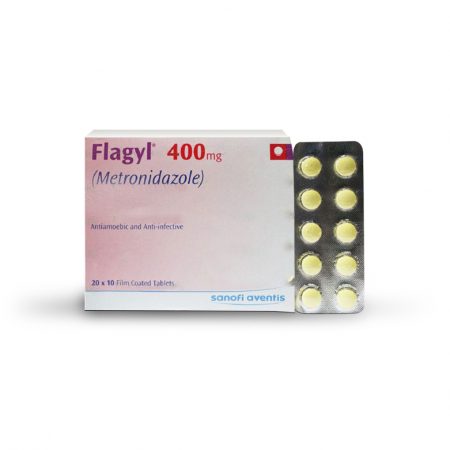What is Flagyl?
Flagyl is an antibiotic containing Metronidazole which fights bacteria. Flagyl is used to treat bacterial infections of the vagina, stomach or intestines, liver, skin, joints, brain, heart, and respiratory tract. Flagyl is effective against anaerobic bacteria and certain parasites. Anaerobic bacteria are single-celled, living organisms that thrive in environments in which there is little oxygen (anaerobic environments). Anaerobic bacteria can cause disease in the abdomen (bacterial peritonitis), liver (liver abscess), and pelvis (abscess of the ovaries and the Fallopian tubes). Giardia lamblia and ameba are intestinal parasites that can cause abdominal pain and diarrhea in infected individuals. Trichomonas is a vaginal parasite that causes inflammation of the vagina (vaginitis). Men and women can take flagyl and some of the available brands of metronidazole in Nigeria are: Flagyl, Emgyl, Loxagyl, Unigyl and Vamis metronidazole.
Flagyl Dosage
Oral route of administration.
Flagyl tablets should be swallowed with water (not chewed). It is recommended that the tablets be taken during or after a meal.
Prophylaxis against anaerobic infection: Chiefly in the context of abdominal (especially colorectal) and gynaecological surgery.
Adults
400 mg 8 hourly during 24 hours immediately preceding operation followed by postoperative intravenous or rectal administration until the patient is able to take tablets.
Children
Children < 12 years: 20-30mg/kg as a single dose given 1-2 hours before surgery. Newborns with a gestation age < 40 weeks: 10mg/kg body weight as a single dose before operation
Anaerobic infections: The duration of a course of Flagyl treatment is about 7 days but it will depend upon the seriousness of the patient’s condition as assessed clinically and bacteriologically.
Public Health Information on Flagyl
- Flagyl will not treat a vaginal yeast infection (Toilet Infection)
Flagyl cannot be used to treat a vaginal yeast infection (Toilet Infection). You may even develop a new vaginal yeast infection after using this medicine. Watch for symptoms such as itching or discharge during or after treatment with metronidazole.
- Can Flagyl cause miscarriage in early pregnancy?
Currently, there is no evidence to suggest that taking Flagyl places a pregnancy at risk at any stage. A recent study looked at over 900 women who had taken metronidazole sometime during their pregnancy and there was no increased risk for preterm birth (birth before 37 weeks), low birth weight, or congenital anomalies. Flagyl is also not an abortion pill.
- Can Flagyl treat staph infection?
Before commencing treatment, your doctor may perform tests to identify the staph bacteria behind your infection, and to help choose the antibiotic that will work best. Antibiotics commonly prescribed to treat staph infections are certain cephalosporins. If you’re given an oral antibiotic, be sure to take it as directed, and to finish all of the medication prescribed by your doctor. Ask your doctor what signs and symptoms you should watch for that might indicate your infection is worsening.
- Can flagyl treat pneumonia?
Pneumonia is an infection in one or both lungs. Bacteria, viruses, and fungi cause it. The infection causes inflammation in the air sacs in your lungs, which are called alveoli. The alveoli fill with fluid or pus, making it difficult to breathe. Use of metronidazole may be appropriate in patients with aspiration pneumonia and evidence of a lung abscess, necrotising pneumonia, putrid sputum or severe periodontal disease. But it is advisable not to treat Pneumonia at home but seek medical help fast because the condition can be fatal. The mortality (death) rate is up to 30% for patients with severe pneumonia who require treatment in an intensive care unit. Overall, around 5%-10% of patients who are treated in a hospital setting die from the disease.
- Can I take Alcohol When using Flagyl?
Do not drink alcohol or consume foods or medicines that contain propylene glycol while you are taking Flagyl and for at least 1 day after you stop taking it. You may have unpleasant side effects such as fast heartbeats, warmth or redness under your skin, tingly feeling, nausea, and vomiting.
- Can Flagyl Cause Seizures?
Seizures and other nervous system abnormalities have been reported in patients treated with Flagyl. You should stop Flagyl immediately for any neurological symptoms such as seizures, headaches, visual changes, weakness, numbness, or tingling.
- Can you take amoxicillin and flagyl together?
It is not advisable to combine antibiotics without the guidance of a medical personal. Nevertheless, the results from a study suggest that combined amoxicillin and flagyl leads to better clinical outcomes. When signs of severe infection are present or a patient is systemically unwell, it is appropriate to prescribe metronidazole or amoxicillin. There is no clear guidance about which antibiotic is preferable first. It is also possible to use metronidazole and amoxicillin together for severe dental infections.
Side Effects Of Flagyl
Dizziness, headache, stomach upset, nausea, vomiting, loss of appetite, diarrhea, constipation, or metallic taste in your mouth may occur. If any of these effects last or get worse, tell your doctor or pharmacist promptly.
This medication may cause your urine to turn darker in color. This effect is harmless and will disappear when the medication is stopped.
Remember that your doctor has prescribed this medication because he or she has judged that the benefit to you is greater than the risk of side effects. Many people using this medication do not have serious side effects.
Tell your doctor right away if you have any serious side effects, including: signs of a new infection (such as sore throat that doesn’t go away, fever), easy bruising/bleeding, stomach/abdominal pain, painful urination.
Get medical help right away if you have any very serious side effects, including: unsteadiness, seizures, mental/mood changes (such as confusion), trouble speaking, numbness/tingling of arms/legs, eye pain, sudden vision changes, headache that is severe or doesn’t go away, stiff/painful neck.
Use of this medication for prolonged or repeated periods may result in oral thrush or a new yeast infection. Contact your doctor if you notice white patches in your mouth, a change in vaginal discharge, or other new symptoms.
A very serious allergic reaction to this drug is rare. However, get medical help right away if you notice any symptoms of a serious allergic reaction, including: rash, itching/swelling (especially of the face/tongue/throat), severe dizziness, trouble breathing.
This is not a complete list of possible side effects. If you notice other effects not listed above, contact your doctor or pharmacist.





